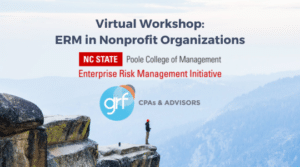March 1, 2024
 On February 22-23, 2024, GRF and NC State University’s Enterprise Risk Management Initiative convened over 100 nonprofit executives and board members to discuss enterprise risk management strategies and tactics.
On February 22-23, 2024, GRF and NC State University’s Enterprise Risk Management Initiative convened over 100 nonprofit executives and board members to discuss enterprise risk management strategies and tactics.
This 5th annual workshop, “Navigating the World of Uncertainties Impacting Nonprofit Organizations,” aims to fill a gap in the resources available to tax-exempt organizations seeking to strengthen their enterprise risk management programs.
Topics covered included:
- Preparing for Advances in Artificial Intelligence
- What is on the Horizon for ERM? AI, ESG, DEIA, and Other Emerging Risks
- Embedding ERM in Project Selection and Strategic Decision-Making
- Engaging the Board of Directors on ERM
- Strengthening Risk Culture to Support Growth and Impact
- Highlights from Executive Perspectives on Top Risks for 2024 & 2034
High-Level Takeaways:
Artificial Intelligence (AI) will change the nature of jobs by automating tasks currently performed by humans. A basic skill everyone should learn is “prompt engineering” or writing input questions to AI tools that return more useful results.
Do not input copywritten, proprietary, confidential, or other sensitive information into AI platforms because the systems use these inputs to “learn” and could generate responses that disclose this information to users outside the organization.
AI-generated content may not be copywritten because it is not human-created, but output should be checked to avoid infringing on copywritten materials, and to verify the veracity and completeness of the outputs.
The 2023 Supreme Court ruling rejecting race-conscious admission policies only applies to universities; however, the rationale underlying this decision will be extended to other aspects of race-conscious decision-making that will affect nonprofits more generally, such as employment and contracting.
Board members should be trained on governance-related legal issues. Common issues arise from policies related to conflicts of interest and confidentiality.
Simplifying the identification of risks and risk matrices can improve buy-in from all levels of an organization. Simplification also helps align risk management with strategic initiatives as well as individual work plans.
Articulating and communicating risk appetite for enterprise-level risks can transform risk management from a “restricting force” to an empowering one.
Integrating ERM into key decision-making processes improves cross-functional communication and strengthens strategic alignment and program design.
Including members of the board of directors in the risk assessment process fosters meaningful discussions with senior management. It can also help build consensus on the organization’s risk preferences.
Use stories to illustrate how using enterprise risk management processes can identify obstacles or prevent bad outcomes. This makes ERM seems less theoretical and a more worthwhile use of time.
Economic conditions, followed by talent management top the list of top risks, with cyber threats becoming a greater concern in both the near-term and long-term, according to NC State’s 2024 global Survey, which asks board members and c-suite executives to rate their top risks for the next year and in the next decade. Other risks increasing in prominence include third-party risks, regulatory changes, climate change, and social media.
Speakers and Facilitators
Amy Boland
Partner and Director, Audit Services | GRF CPAs & Advisors
Amy Wares
Enterprise Risk Management Specialist, Risk & Advisory Services | GRF CPAs & Advisors
Andreas Alexandrou
Partner, Audit Services | GRF CPAs & Advisors
Bill Rand
McLauchlan Distinguished Professor of Marketing and Analytics | NC State University
Curt von Boguslawski
Country Representative, Côte d’Ivoire | Population Services International
Elise Mugabo
Director of Enterprise Risk Management and Operational Excellence | Population Services International
Ericka Kranitz
Professor of Practice & Director, Master of Management, Risk & Analytics Concentration | Habitat for Humanity International
Jeffrey Tenenbaum
Managing Partner | Tenenbaum Law Group PLLC
Joe Pugh
Senior Director, Enterprise Risk Management and Compliance | AARP
Mac Lillard
Senior Manager, Risk & Advisory Services | GRF CPAs & Advisors
Mark S. Beasley
Director of the ERM Initiative | Poole College of Management NC State University
Melissa Musser
Partner and Director, Risk & Advisory Services | GRF CPAs & Advisors
Michael Patrick
Counsel and Senior Director of Governance, Risk Management, and Compliance | Habitat for Humanity International
Pherabe Kolb
Vice President, Operational Effectiveness & Enterprise Risk Management | Aspen Institute
Ricardo Trujillo
Partner, Audit Services | GRF CPAs & Advisors
Terri Wallace
Director of Governance, Risk Management, and Compliance | Habitat for Humanity International
Plans for next year’s event are underway!